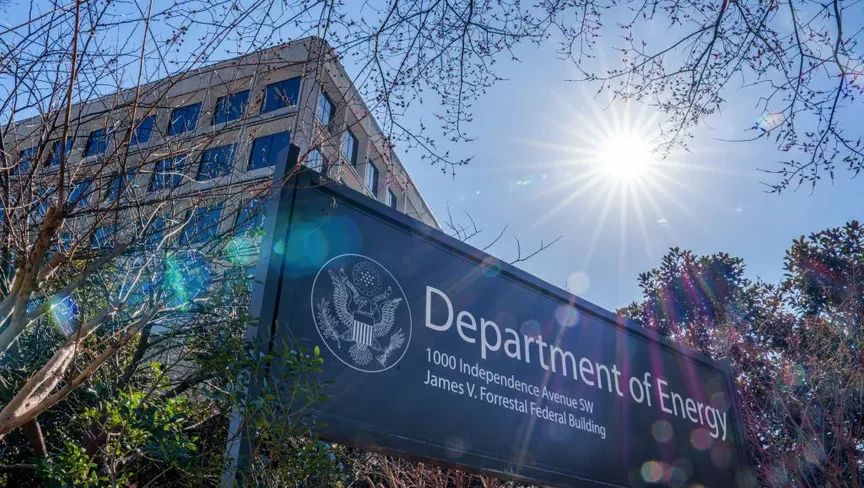
The Department of Energy made an unprecedented number of loans to ambitious clean energy projects throughout the Biden administration. Now the fate of that financing is uncertain amid President Trump’s ongoing attacks on federal climate and clean energy spending.
Under Biden, the DOE’s Loan Programs Office issued a total of 53 loans and loan guarantees worth over $107 billion. They went to large-scale projects including electric-vehicle factories from Ford and Rivian, the restart of the Palisades nuclear power plant in Michigan, and facilities that produce sustainable aviation fuel. The map below, based on public DOE data compiled on January 17 and shared with Canary Media, shows LPO loans by status for projects where geographic data is available. See the data table at the end of this article for more information on all projects that received LPO loans.

It’s unclear how the Trump administration will treat these loans.
LPO’s new director, John Sneed, is exploring whether it’s legally viable to cancel existing loans made by the office, per reporting from Bloomberg.
About 44% of the LPO financing announced under Biden — nearly $47 billion — is currently in the conditional phase, meaning it’s unfinalized and still subject to negotiations with the federal government. A big question mark hangs over these conditional loan commitments, though even finalized loans could be targeted for clawbacks, experts say.
The LPO, which awarded key financing to Elon Musk’s Tesla in 2010, saw its lending authority soar to nearly $400 billion thanks to the 2022 Inflation Reduction Act. As of January 17, the office reported that over 160 applicants were currently seeking more than $200 billion in loans for various energy projects.
Sneed intends to focus the office’s remaining loan authority on technologies like nuclear power and liquefied natural gas, Bloomberg reported, technologies favored by Trump’s newly confirmed Energy Secretary Chris Wright. Wright is the founder and former CEO of fracking firm Liberty Energy and sat on the board of small modular nuclear startup Oklo. Liberty also invested $10 million in next-gen geothermal startup Fervo Energy under Wright’s tenure.
The LPO’s stated mission is to provide low-cost financing to clean energy and transportation projects that struggle to attract investment from traditional lenders who are wary of unique or first-of-a-kind investments. In seeking to make good on that promise, the LPO has actually earned — not lost — money over its 20-year history.
See the table below for the full list of Biden-era LPO loans.


The U.S. solar energy industry has succeeded in doing something that would have been hard to imagine a few years ago: It has officially built more than enough factories to meet the country’s demand for solar panels.
The nation can now produce nearly 52 gigawatts of solar panels each year, per a new tally from the Solar Energy Industries Association. That’s up from the 40 GW of capacity reported in late 2024. These numbers don’t count actual production, which is subject to factors like staffing and market demand, but rather what the industry is capable of. Current capacity exceeds the module component of SEIA’s goal from 2020, which was for the whole solar supply chain to hit 50 GW by 2030.
The factory buildout employs workers across the U.S. in high-tech manufacturing roles and diminishes reliance on China, the long-time leader in solar manufacturing. But solar panels, which industry insiders refer to as modules, are just the last step of the solar supply chain: Currently, U.S. factories assemble modules from solar cells that are almost exclusively produced overseas. Those cells, which convert sunlight into electricity, incorporate wafers that are meticulously sliced from silicon ingots; factories that make ingots, wafers, or cells are more complex and capital-intensive than module assembly plants.
Those precursor steps have lagged behind the U.S. module buildout, but companies have pledged to build factories for 56 GW of solar-cell capacity in the next few years, SEIA said. Those proposed projects, if they get built, would meet the needs of the newly revitalized U.S. solar-panel industry. But erecting solar-cell factories requires a step change in capital investment compared with module assembly.
In November, legacy solar manufacturer Suniva kicked off the first new domestic cell production since U.S. producers (Suniva included) succumbed to competition from China in the 2010s. ES Foundry launched pilot cell production at its South Carolina plant in January. The company plans to employ around 500 workers by this summer and ramp up to 3 GW of annual production capacity by the end of September.
Five more cell factories are under construction, per SEIA. They include QCells’ complex in north Georgia, which should bring 3.3 GW of cell production online later this year, and Silfab Solar’s 1 GW plant in South Carolina.
But President Donald Trump swiftly attacked his predecessor’s investments in clean energy, signing an order on his first day in office to “immediately pause the disbursement of funds” from the Biden administration’s landmark climate and infrastructure laws. That order targets grants, loans, and other appropriated funds and therefore does not seem to affect tax credits, Canary Media previously reported. But the move has sown confusion in clean-energy markets and could presage attempts to undo the legislation that created the tax credits.
Some companies are thus holding back on solar-cell factory investments until they see what the Trump administration does with a key manufacturing tax credit, which has proven vital to secure construction loans.
The rebirth of U.S. solar manufacturing had to start somewhere, and assembling panels made sense as that first step. Now, all those panel makers could become anchor customers for the next link in the chain — the proposed cell manufacturers. But making that jump isn’t so easy.
Take the case of Heliene, a company based in Ontario, Canada, that nonetheless has established its bona fides as a committed U.S. solar manufacturer.
Heliene opened a solar-module factory in Mountain Iron, Minnesota, back in 2017, during the first Trump administration. The company later expanded that facility to assemble 800 megawatts of panels per year with a staff of 320 workers. Another expansion is already underway to grow that workforce to 520 and capacity to 1.3 GW by April.
In November, when previously bankrupt Suniva began the first U.S. cell production in years, Heliene swooped in to purchase every cell Suniva’s new factory could make. Heliene could, for the time being, tout its products as the only U.S.-built modules filled with U.S.-built cells.
Now Heliene is working on its boldest move yet: a $200 million solar-cell factory to be built somewhere in the U.S. in partnership with India’s Premier Energies. But Heliene founder and CEO Martin Pochtaruk told Canary Media in January that he couldn’t make the final call on that plant given the uncertainty around what will happen to Biden-era tax credits under Trump.
Building a cell factory requires a significant step up in dollars and complexity compared with a module-assembly plant, Pochtaruk explained. Putting panels together is a largely mechanical task that costs around $30 million of capital investment for every GW of production, he said.
Solar-cell production costs more than four times that, at about $130 million per GW, Pochtaruk noted. “It’s a chemical process that is much more complex. You need to build a clean room that is similar to an operating room, but industrial-sized.”
Cell production exposes silicon wafers to chemicals in liquid and gaseous forms, which must unfold in precisely calibrated environments, Pachtaruk added. Water used in the process requires treatment before it can be reused or sent to the sewer. The equipment to do all these things drives up costs relative to module assembly and makes permitting more complicated.
That raises the stakes for anyone looking to put their chips on the table for American solar-cell production — even if they’ve already found success in their panel-assembly bets. The prospects of financing these bigger bets are intimately tied to the future of federal manufacturing tax credits, part of the Biden policies that Trump has vowed to dismantle.
Even successful solar manufacturers typically don’t want to fork over their own cash for the hefty expense of a new cell factory. They turn to lenders to finance construction costs. But lenders have a hard time loaning money to a type of business without much of a track record to evaluate, and the current U.S. cell-manufacturing landscape is mostly nonexistent.
Cell manufacturers have something else going for them, though: the 45X tax credit. As enacted in the Inflation Reduction Act of 2022, 45X awards a set amount of money for each key solar component that a company makes in the country in a given year. If the manufacturer doesn’t have enough tax liability to absorb all that credit, it can sell the credits to another entity, generating cash to pay down debt or invest in further expansion.
Heliene pulled that off last fall with 45X credits from module production and netted about $50 million from the transaction.
Financial institutions mulling a $100 million–plus loan to a solar-cell manufacturer want to use the future 45X credit as collateral, Pochtaruk said. Future cell sales may be hard to predict, but a guaranteed payout based on the number of cells produced is easy to model (at least in a world where the U.S. government honors legally binding contracts and pays its obligations).
“Lenders will not agree to come forward until there’s clarity” on the long-term status of the tax credits, Pochtaruk said. So Heliene is still finalizing a location in the U.S., tabulating construction costs, and then will need to make a final call on the investment by late April. A Premier Energies executive told investors Monday that the plan is on pause pending clarity on the fate of the tax credits.
The potential loss of tax credits may be less consequential to companies like Qcells, which can draw construction funds from its corporate parent, Korea’s Hanwha. A smaller solar-focused company like Heliene doesn’t have other corporate coffers to rely on in lieu of tax-credit–based financing.
It’s still entirely possible that the credits will survive. Under normal circumstances, it would take a new act of Congress to undo them. A cadre of Republicans in Congress has publicly urged leadership to preserve them, based on the economic benefits they bring to their districts. Meanwhile, SEIA coordinated a lobbying push on Capitol Hill Wednesday to meet with more than 100 members of Congress or staff to urge them to protect the credits.
The current uncertainty, though, is at the very least delaying the commitment of more private funds to build solar-cell factories. Those projects — and the high-tech, well-paying manufacturing jobs they come with — could collapse altogether if the situation persists or Congress undoes the recently created tax credits.
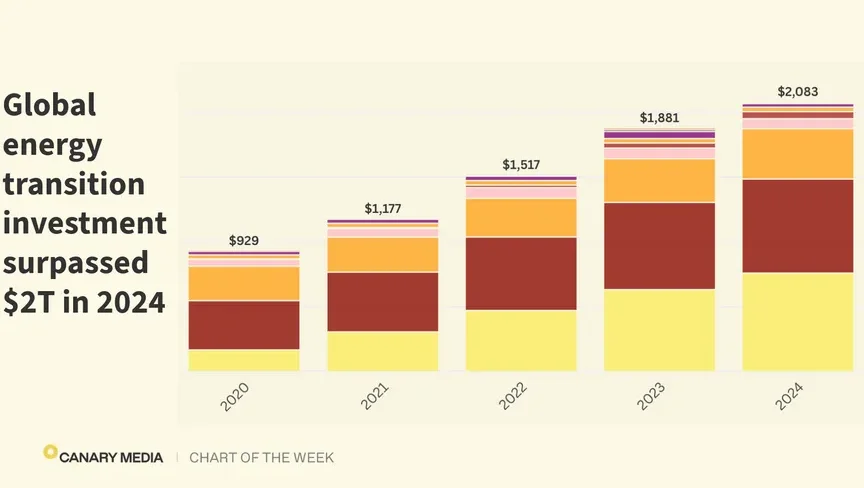
Canary Media’s chart of the week translates crucial data about the clean energy transition into a visual format.
Nearly $2.1 trillion was invested in the global energy transition in 2024 — the highest-ever annual amount.
Last year’s total energy-transition investment was 11% higher than in 2023 and more than double what was spent in 2020, per BloombergNEF.

Most of this money is flowing to two energy-transition sectors: electrified transportation and clean energy.
More than $757 billion was invested in passenger and commercial EVs, electric two- and three-wheelers, and public EV-charging stations. That’s a 20% increase from 2023. Another $728 billion was spent on renewable energy projects ranging from wind to solar to hydropower, a record high but only about 8% more than in 2023. Energy-storage spending, meanwhile, surged 36% last year to nearly $54 billion.
The third-biggest category was power grids, which need to grow in every country to accommodate the rapid expansion of clean energy. Just over $390 billion was invested in 2024 on expanding and retooling grids across the world, up about 15% compared with the year prior.
While funding for these mature energy-transition technologies reached new heights in 2024, earlier-stage climate technologies had a rougher year. Spending on carbon capture and storage was less than half of what it was in 2023. Investment in hydrogen and clean-industry projects was also cut almost in half.
China alone accounted for nearly 40% of last year’s energy-transition investment, outpacing the U.S., EU, and U.K. combined. China also grew its spending faster than any other major country or region last year, while in the EU and the U.K., the sector attracted less money than in the prior year.
By a different measure, from the International Energy Agency, energy-transition investment is now far exceeding funding for fossil-fuel projects. That’s a good thing for the global bid to eliminate use of planet-warming fossil fuels. But even last year’s record-setting pace is not enough to decarbonize the planet. More is needed, the IEA says, especially in developing nations.
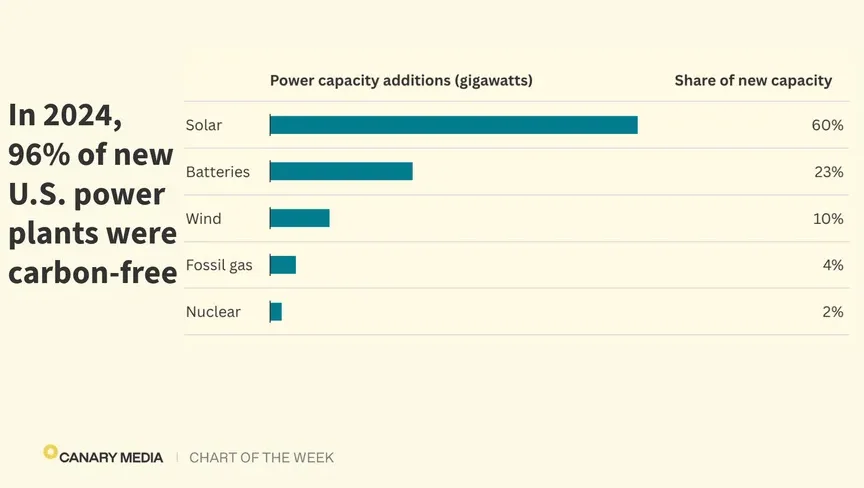
Canary Media’s chart of the week translates crucial data about the clean energy transition into a visual format.
The amount of carbon-free energy built in the U.S. last year far eclipsed the growth of new fossil-fueled power plants.
The U.S. grid added a total of just over 56 gigawatts of power capacity last year. A whopping 96 percent of that came from solar, battery, wind, nuclear, and other carbon-free installations, per new Cleanview analysis of U.S. Energy Information Administration data.
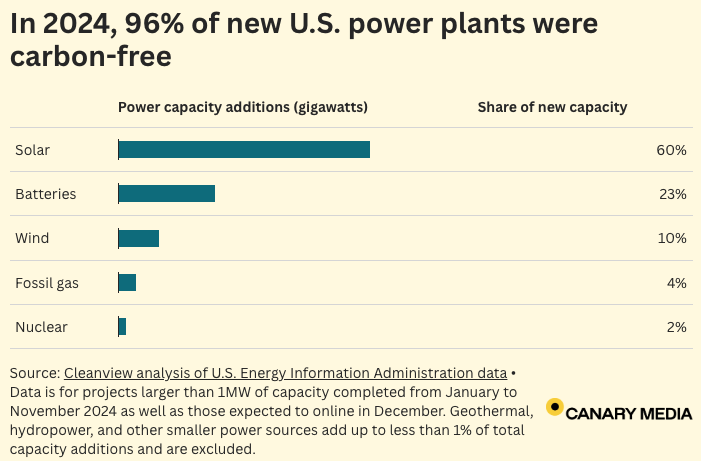
Solar installations dominated power plant additions — 34 gigawatts of utility-scale solar were constructed across the U.S., a 74 percent jump from 2023’s record-high year. Texas and California drove most of this surge.
Grid batteries were the next-biggest new source of power capacity — and saw the fastest growth. The U.S. built 13 GW of energy storage last year, almost double 2023’s record-shattering 6.6 GW. Texas and California led the way here as well.
Wind was the third-biggest source of new capacity, but installations dropped for the fourth year in a row as the industry continued to struggle through lingering supply-chain issues, a plodding interconnection process, and local opposition to projects. Just 2.4 GW of new gas and 1 GW of nuclear went online in 2024.
The U.S. has rolled out more clean energy than fossil-fueled power plants for years now, helping the grid get cleaner and less carbon-intensive. Power emissions have fallen steadily since peaking in 2007 as fossil gas and renewables have replaced coal.
Still, fossil fuels generate the majority of the country’s power and the U.S. faces an uphill battle to decarbonize its grid by 2035, a goal set by outgoing President Joe Biden.
Fossil gas is currently the top source of electricity generation in the U.S., and last year emissions from its use in the rose nearly 4 percent. As big tech firms look to build more energy-intensive data centers to support their AI goals, the sector could become even more reliant on fossil fuels. That surging power demand is already extending the life of coal plants and causing utilities to propose building more gas-fired power plants.
In order to eliminate carbon emissions from the grid, the U.S. is going to need to figure out how to build enough clean energy to dethrone fossil fuels. That was a hard task even when Biden was president and before the AI-driven electricity boom took hold. It will be an even taller task under incoming President Donald Trump, who has vowed to double down on fossil fuels.
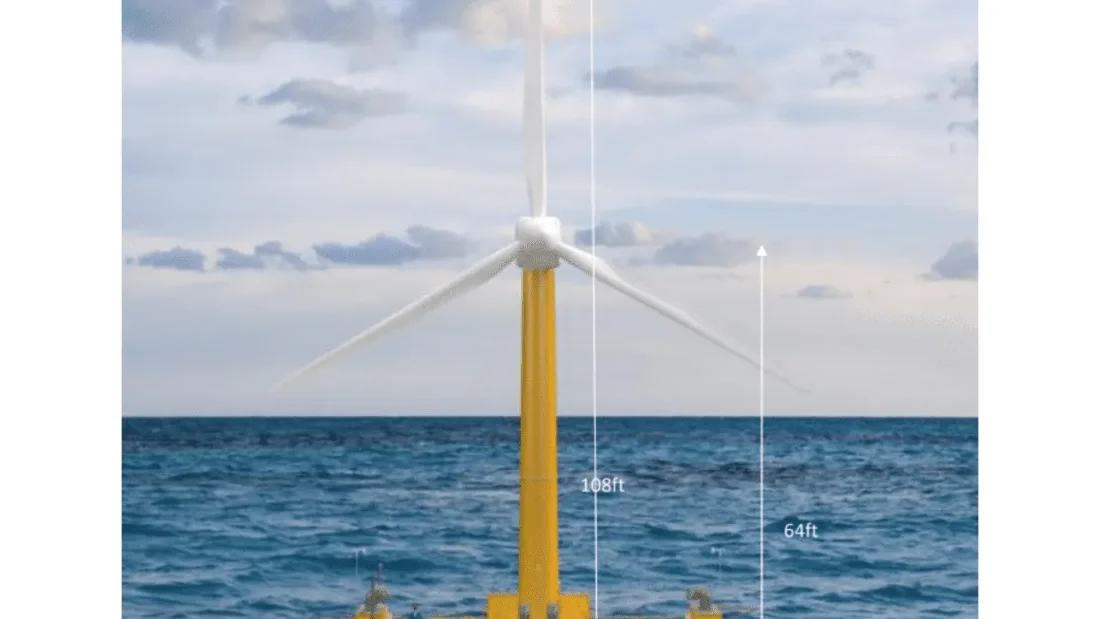
OFFSHORE WIND: Maine’s plans to develop a floating offshore wind industry are at a pivotal point, as researchers refine equipment and wait for regulatory approval to sell power generated by a planned test array. (Maine Monitor)
ALSO: Maryland regulators approve a request to increase the amount of power produced by a planned wind farm off the Maryland and Delaware coast. (WBOC)
CLIMATE:
GRID:
POLITICS: Energy policy debates will take center stage in the Maryland legislature this year as the state tries, all at once, to rein in rising prices, meet clean energy goals, and ensure enough power generation. (Maryland Matters)
EFFICIENCY: Vermont’s program providing weatherization funding for low-income residents is running low on money as federal funds dry up. (Vermont Public)
TRANSPORTATION: New York City’s congestion pricing has reduced traffic in the central business district by more than 8%, but is also expected to redirect traffic into some of the city’s poorest neighborhoods, increasing pollution in places that already bear heavy environmental burdens. (Streetsblog, Inside Climate News)
RENEWABLES: Environmental justice advocates in New York City push the state’s power authority to plan more renewable energy projects in the city to reduce the use of fossil fuel peaker plants. (Inside Climate News)
SOLAR: A New York appellate court rules a town’s attempt to block a commercial solar development runs counter to state mandates to increase renewable power use. (Times Union)
COMMENTARY: The offshore wind industry in Maine can attract investment, support economic development, and create jobs, regardless of environmental benefits, says a newspaper editorial board. (Portland Press Herald)
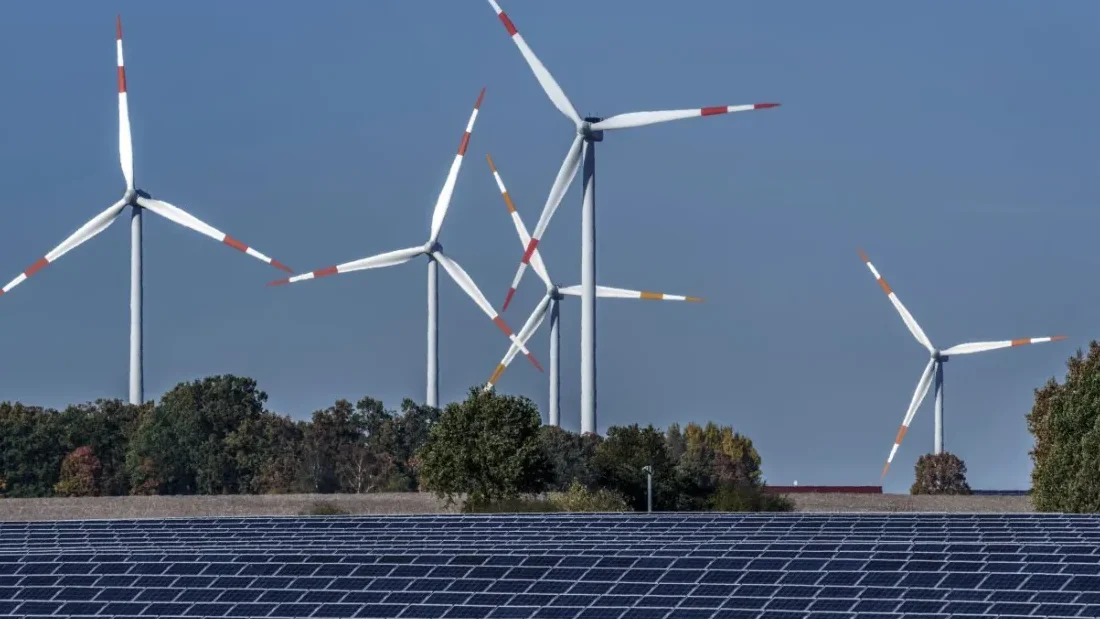
RENEWABLES: The U.S. Interior Department institutes a 60-day pause on approvals for leases, rights of way, and contracts for clean energy projects on public land and waters. (The Hill)
ELECTRIC VEHICLES:
GRID:
OFFSHORE WIND:
OVERSIGHT: “It’s very bureaucratic and it’s very slow”: During a trip to view damage from Hurricane Helene, President Trump suggests abolishing the Federal Emergency Management Agency and leaving disaster response to states. (Blue Ridge Public Radio, Politico)SOLAR:
EFFICIENCY: U.S. residents bought 37% more heat pumps than gas furnaces in the first 11 months of last year, marking the electric appliances’ biggest lead over fossil fuel heating yet. (Canary Media)
OIL & GAS: The Navajo Nation files a lawsuit challenging the Biden administration’s 2023 ban on new federal oil and gas leases around a New Mexico historical site, saying it causes financial hardship. (E&E News, subscription)
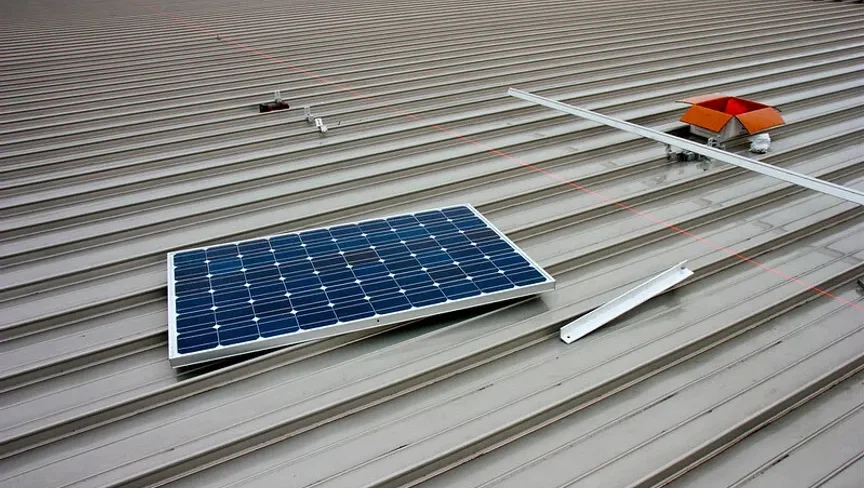
A recent ruling by a Wisconsin appeals court closes the door on the long-standing battle for third-party-owned solar in the state — at least for the near future, as disappointed advocates see it.
On Jan. 3, the court dismissed ongoing legal proceedings regarding a Stevens Point family’s efforts to buy electricity from solar panels that would have been installed on their home but owned by a solar company. The arrangement, known as third-party solar, allows customers access to solar power without the upfront cost of installing panels.
The family moved before their case concluded, though, making it “moot” in the court’s opinion. Advocates had hoped a court decision could still clarify that under existing law third-party-owned solar is indeed legal, but those hopes are now dashed.
“I think this road is at a dead end at this point,” said Will Kenworthy, Midwest regional director for Vote Solar, which had brought a petition before the Public Service Commission of Wisconsin on the family’s behalf, asking the commission to affirm their right to do the project. “We had a chance to resolve it once and for all, and we made the effort to get it this far, then had the carpet pulled out from underneath us.”
In late 2022, the Public Service Commission ruled in favor of the family, who wanted to install rooftop solar that would be owned by North Wind Renewable Energy Cooperative, a developer based nearby.
After the commission decision, the Wisconsin Utilities Association filed a lawsuit challenging the commission’s ruling, arguing such arrangements violate utilities’ monopoly rights to provide power.
A trial court remanded the issue back to the commission for further information. Vote Solar, represented by the Environmental Law & Policy Center, appealed that ruling and hoped the appeals court would affirm the commission’s decision.
But when the Public Service Commission members found out that the family had moved without installing solar, they withdrew the decision on their case.
“It closes this phase of the very long and ongoing saga here to clarify the law for third-party financing,” said ELPC Senior Attorney Brad Klein. “What’s frustrating with this setback is a lot of work went into teeing up a strong legal case for the commission and the courts. It got knocked out on a procedural non-substantive issue on the status of the customers, which leaves the rest of Wisconsin customers in the dark on the lawfulness of this tool.”
The commission’s decision on the Stevens Point case had applied only to that particular project. But advocates thought the move could pave the way for others to do third-party-owned solar.
“The hope with that decision was it would serve as a precedent — if this one family can do it, then a second family, a third family, a fourth family could do it too,” said John Albers, a director at Advanced Energy United, which filed an amicus brief in the case. “The frustrating part is none of this should be happening. Wisconsin is an outlier — you’ve got Michigan, Illinois, and Iowa that all allow third-party ownership.”
Nationwide, third-party ownership makes solar more accessible for many households, nonprofits, churches, schools, and government agencies since the solar developer or other third-party owner pays the upfront costs and reaps the tax incentives while providing power and passing on energy bill savings to the resident or nonprofit.
The direct-pay provision in the Inflation Reduction Act makes third-party ownership less crucial for nonprofit entities including government agencies since direct payments — unlike tax incentives — can be tapped even if one doesn’t pay taxes. But the paperwork requirements for direct pay can be onerous, and under the Trump administration, pieces of the IRA may be rolled back.
Advocates have long argued that existing Wisconsin law actually does allow for third-party-owned solar. But without clarity from a government authority, utilities have refused to interconnect third-party-owned solar arrays, and developers have been reluctant or unwilling to explore the arrangement with customers.
A legal battle over Eagle Point Solar’s plans to do a third-party-owned solar project with the city of Milwaukee, for example, has been before the Public Service Commission and in the courts for years.
Kenworthy said advocates were hoping the commission and appellate court would offer “an interpretation of statute that avoids this preposterous outcome that someone putting a small solar array on someone’s roof is suddenly constituting a utility.”
“We think it’s as urgent as ever to get third-party ownership available to the people of Wisconsin. We’re still interested in trying to figure out if there’s a way we can address it,” Kenworthy continued. That could mean another resident attempting third-party-owned solar, a lengthy and frustrating undertaking, as the Stevens Point family saw.
“It was illustrative of the problem people are facing,” Kenworthy said. “Getting solar on a residential rooftop is a tough choice anyway, and when you have that type of uncertainty out there it really is a deterrent.”
In an amicus brief, Advanced Energy United had made the case that residential third-party-owned solar would benefit all ratepayers and could reduce reliance on planned new gas plants in Wisconsin. The group is among many that have filed testimony opposing a $1.2 billion new gas peaker plant that the utility WEPCO plans to build at the site of its Oak Creek coal plant.
“Really, the more behind-the-meter solar you have in Wisconsin, the better for all ratepayers,” he said. “Utilities wouldn’t need to spend as much on new generation if homeowners were able to generate at home.”
In years past, advocates have pleaded with the legislature, courts, and commission to offer clarity on third-party ownership, so far to no avail. The Public Service Commission declined to rule on a petition from the Midwest Renewable Energy Association seeking to develop third-party-owned solar, noting that the association did not have a specific project contract.
“The problem remains unresolved, and it’s going to require some additional work over time, but we are going to continue pushing,” Klein said. “I’m confident in the long-term outcome because I think we’re right on the law. We don’t know if the next effort will mirror this one, which was an attempt to be responsive to the commission’s request to bring a specific case to them. We may do that again, or there’s other avenues. Certainly, the legislature could act. There are other ways the commission could act. We’ll be exploring all of those options.”
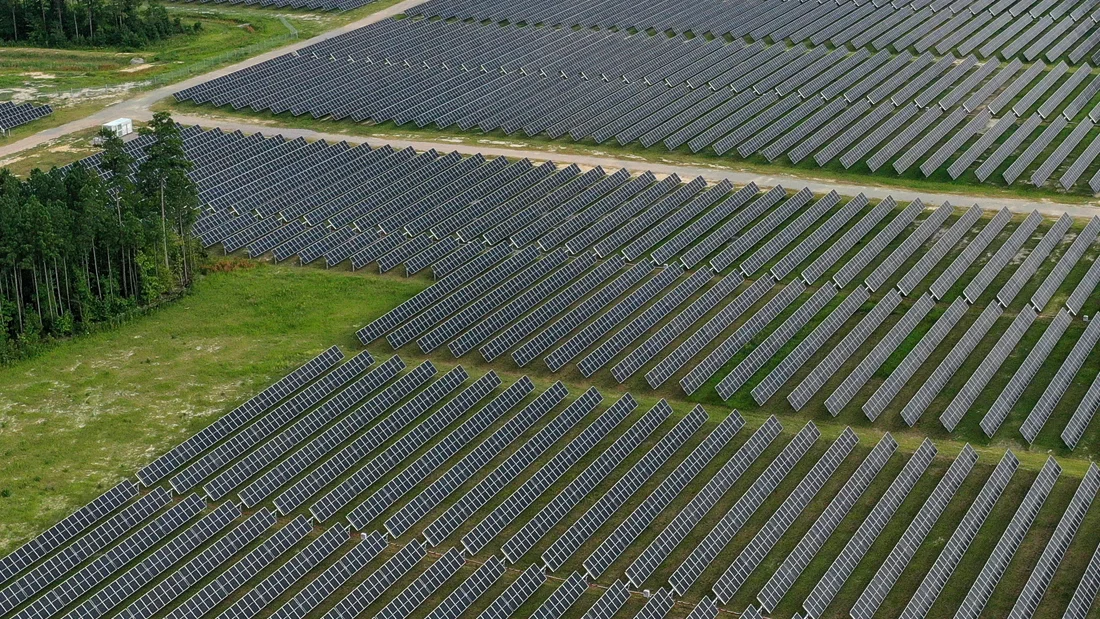
SOLAR: Virginia lawmakers and lobbyists back a proposed state board that would weigh in on proposed solar and battery storage projects but leave final decisions to localities, although its creation could be vetoed by Gov. Glenn Youngkin. (Inside Climate News)
ALSO: Duke Energy announces it’s completed its 10th solar farm in Florida, making good on its 2020 pledge to state regulators to build nearly 750 MW of solar generation in the state. (Panama City News Herald)
COAL ASH: Duke Energy, Louisville Gas & Electric/Kentucky Utilities and other power companies send a letter to Trump’s EPA nominee asking for“immediate action” to roll back federal regulation of toxic coal ash and rescind recent enforcement actions. (Canary Media)
STORAGE:
GRID:
ELECTRIC VEHICLES: Alabama suspends its electric vehicle charger installation program, citing President Trump’s order pausing its federal funding. (E&E News, subscription)
COAL:
EFFICIENCY: A new report finds Tennessee residents use 30% more electricity than the national average, largely because of the state’s lagging energy-efficiency building standards. (Knoxville News Sentinel)
NUCLEAR: South Carolina Gov. Henry McMaster calls for the expansion of the VC Summer nuclear plant, which previously collapsed in the “Nukegate” controversy but recently has been revived by state-owned utility Santee Cooper. (Post and Courier, South Carolina Daily Gazette)
OIL & GAS: A Texas city council approves a gas company’s proposal to expand its fracking operations near a daycare center and neighborhood. (Inside Climate News)
BIOMASS: South Carolina residents deal with noise, dust and pollution from a nearby wood-pellet plant, one of 28 similar facilities across the Southeast and seven in the Carolinas. (WSOC)
HYDROGEN: The U.S. Energy Department collects public input on plans to produce hydrogen from natural gas at multiple sites in West Virginia, Ohio and Pennsylvania that are part of the Appalachian Regional Clean Hydrogen Hub. (WYSO)

OFFSHORE WIND: Shell withdraws from its partnership in an offshore wind farm off New Jersey, claiming a loss of $1 billion, but the developers say they will still proceed with the project. (New Jersey Monitor)
ALSO:
GRID: Pennsylvania Gov. Josh Shapiro announces a plan to fast-track the development of power plants and offer hefty tax incentives to new generators and projects that use hydrogen fuel. (Associated Press)CLIMATE:
TRANSPORTATION: Trump considers revoking a key federal approval for New York’s congestion pricing program. (New York Times)
AFFORDABILITY: Trump’s proposed tariffs on imports from Canada could increase energy bills for Maine residents drawing power from across the border or using electricity from power plants fueled by gas coming from Nova Scotia. (Portland Press Herald, subscription)
UTILITIES: Two utilities file suit against a Connecticut regulatory agency, saying the chairperson is unfairly taking control of all decisions made by the body. (CT Insider)
STORAGE: A New England hydropower company lays out plans to build its first battery storage installation at one of its stations in western Massachusetts. (Greenfield Recorder)
EMISSIONS: A Massachusetts metal production company says it has developed processes to refine rare earth metals, used in technologies including electric vehicle batteries, without producing any emissions or toxic waste. (New Hampshire Public)
EFFICIENCY: A new program in New Haven, Connecticut, uses $1.5 million in federal funds to help low-income residents access weatherization, heat pumps, and other energy efficiency measures. (NBC Connecticut)
COMMENTARY: Pennsylvania lawmakers should prioritize bills that promote renewable power so the state doesn’t miss out on environmental benefits, job creation, and lower energy prices during the Trump administration, says an environmental advocate. (Pittsburgh Post-Gazette)
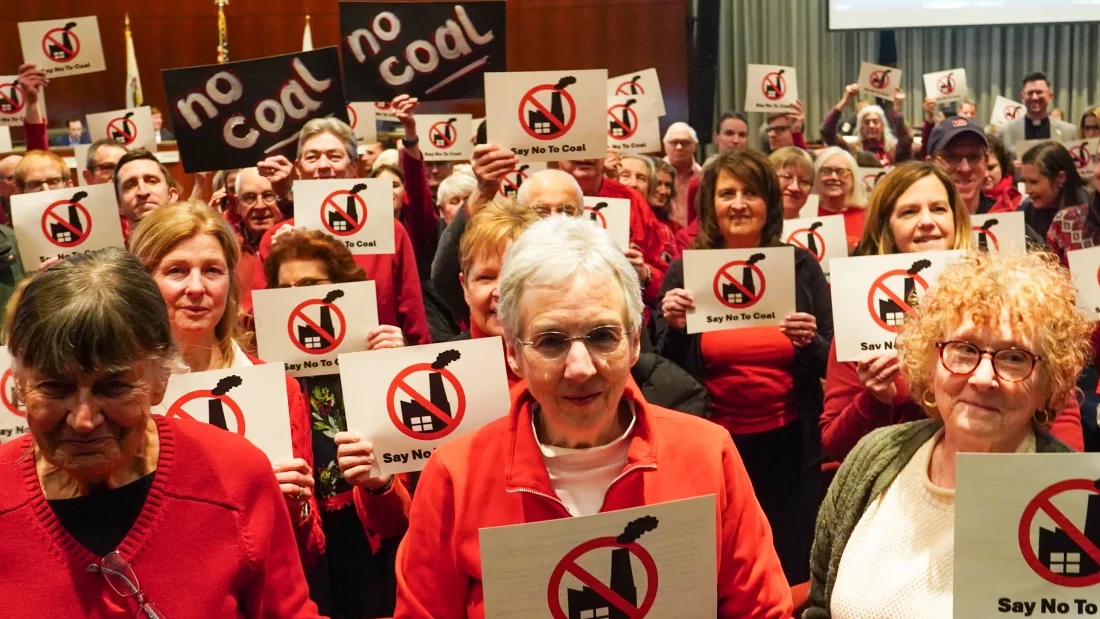
FOSSIL FUELS: Interconnection delays for renewable energy and rising demand from data centers are prolonging Illinois’ clean energy transition and extending the life of coal and gas plants. (Chicago Sun-Times)
ALSO: Former North Dakota Gov. Doug Burgum is confirmed as the Trump administration’s Interior Secretary, a role that Republican supporters say can help advance oil, gas and coal production on federal land. (North Dakota Monitor)
EMISSIONS: Minnesota’s greenhouse gas emissions increased 6.4% from the end of 2020 to the end of 2022, signaling a return to activity coming out of the pandemic but that state officials say doesn’t reflect recent climate investments. (Star Tribune)
ELECTRIC VEHICLES: Panasonic officials are optimistic that the company’s new $4 billion electric vehicle battery plant outside Kansas City will be able to ramp up to full production even as the Trump administration targets EV incentives. (Flatland)
CARBON CAPTURE: Opponents of North Dakota legislation to ban eminent domain for carbon pipelines cite a recent study claiming enhanced oil recovery using carbon dioxide could generate billions in new tax revenue. (North Dakota Monitor)
CLEAN ENERGY:
CLIMATE: A Nebraska lawmaker wants to join 26 other states in creating a dedicated climate office that could help leverage federal funds for climate initiatives. (Nebraska Examiner)
NUCLEAR: The owner of a shuttered southwestern Michigan nuclear plant that secured a $1.5 billion loan from the Biden administration to restart the facility is not concerned about the Trump administration attempting to claw back the financing. (Grist/Interlochen Public Radio)
OVERSIGHT: Minnesota Gov. Tim Walz appoints an energy efficiency expert focused on the gas industry to an open seat on the state’s Public Utilities Commission. (Star Tribune)
SOLAR: A developer brings online two solar projects totaling 95 MW of capacity in southern Minnesota. (Solar Power World)
GRID:
BIOFUELS: A company cites the oversaturated ethanol market as a main reason for temporarily closing a Minnesota biofuel plant. (Star Tribune)